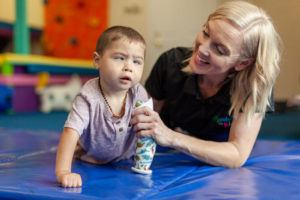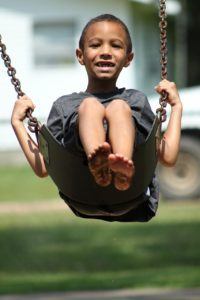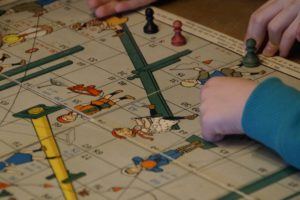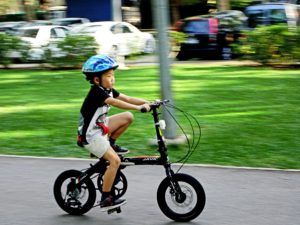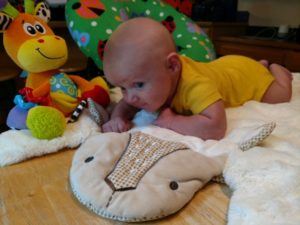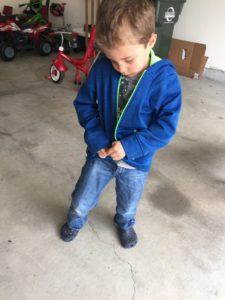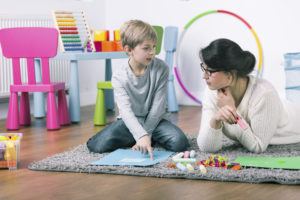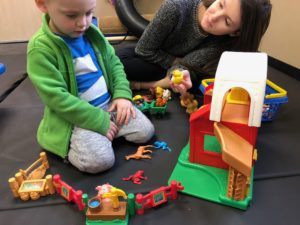child development
Outpatient Therapy Services
*Children of any age are referred to ABC Pediatric Therapy by their physician due to concerns with gross motor, fine motor and/or speech and language skills.

*Children are evaluated by the Therapist who is trained and specializes in the area of concern (Physical Therapist, Occupational Therapist or Speech Language Pathologist) using a functional evaluation. The family is involved in setting goals in the best interest of the child.
*After therapy is recommended, the Therapist shares the strengths and goal areas for the child with the parent and determines with the parent priorities for functional goals.
*Direct, one-on-one therapy is provided by the Therapist in the outpatient center with the parent or caregiver present; a home exercise program is established for optimal carry-over at home. Visits are scheduled based on the needs of the child, typically one time per week and up to five times per week if necessary.
*The family’s insurance company is billed for the therapy sessions; alternative funding is available as needed.
**A therapist is college educated on normal and abnormal child development often having a masters or doctorate degree.
Early Intervention Services
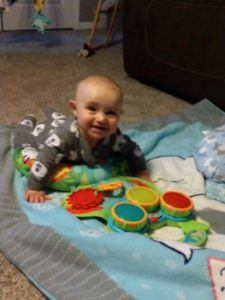
*Children (ages birth through three years old) are referred to Help Me Grow by anyone having a concern with the child’s development in any area – behavior, gross motor, fine motor, speech or cognition. (This could be a parent or physician)
*Children are evaluated by at least two different specialists using a standardized test to determine eligibility for services.
*After eligibility is determined, the family is involved with the team in establishing an IFSP (Individualized Family Service Plan) which identifies the family’s primary concerns. Based on these concerns, outcomes (goals) are established and a PSP (Primary Service Provider) is determined. (These outcomes are supposed to be related to the family’s daily routines – i.e. meal time, bath time, etc.)
*The PSP, often a Developmental Specialist*, rather than a Therapist (PT, OT or SLP) sees the child at home or other natural environment (such as daycare or babysitter). Visits are typically scheduled monthly. If available, a licensed therapist may consult and advise the Developmental Specialist on how to encourage development.
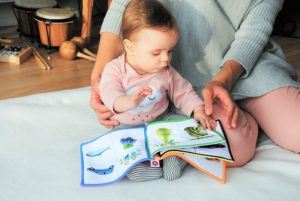
*The coaching model is used – the PSP coaches the family to carry through the activities vs. providing one-on-one therapy.
*The first 55 hours of services in a year are provided at no cost to families. If more than 55 hours are needed, the families may then be charged for additional services through the family’s insurance or other means.
*Developmental Specialist: A professional, certified by the Ohio Department of Developmental Disabilities, trained to develop and implement a program which works to enhance a child’s developmental needs birth-age 3.
If you feel outpatient service would best meet your child’s developmental challenges, reach out to us at http://www.abcpediatrictherapy.com. We are here to educate you and inspire your child.
Read MoreWe know we need to limit our kids’ screen time but how often do we parents think about our own screen time and how it impacts our children? There are countless articles on the dangers of screens for our children but now more concern than ever is being raised about parents’ screen time.
I stay home with my sons two days a week and countless times I’ve been at the park/swim lessons/restaurants with them and nearly every parent is on their phone. They aren’t interacting with each other and certainly aren’t interacting with their children. Not only our we losing an opportunity to build our village but we are losing out on precious moments with our children that we can’t get back.

This article from psych central discusses five reasons to put our phones away and be present for our children.
https://psychcentral.com/lib/put-your-phone-away-and-pay-attention-to-your-kids/
The last point stating that “Our kids need our first priority to be our relationships with them, not with our phones” should truly be all we need to read. There is so much for us to teach our children and they crave our attention, our encouragement, and our love. When our heads are buried in our phones we aren’t living real life and providing our children with all they need to properly develop and deserve.
I’ve deleted social media apps from my own phone in an effort to disengage from it. My wife struggles more so and recently experienced a little gut punch when our 5-year-old said he didn’t want her on her phone so much.
So what can you do?
- Have a designated place to put your phones when you get home and basically don’t touch them until the kids are in bed. This especially means NO PHONES AT THE DINNER TABLE. This is our current strategy and the one we are finding the most success with. It gives us uninterrupted, quality time with the kids and spouse and it also feels good to disconnect nightly
- Turnoff notifications for your apps. DO THIS. Don’t be a slave to every little ping your phone makes. Very little of it is so important that it can’t wait a couple hours
- Use apps the monitor usage and post reminders to put your phone down. A list can be found here but my wife warns they are effective at first but can be easy to ignore over time https://www.digitaltrends.com/mobile/best-apps-for-limiting-your-screen-time/
- Remember your manners! When your engaged in conversation or an activity with your child, don’t let a chirp from your phone interrupt the moment. That new Instagram post will be there later
Speaking of screen time, have you seen it impact your child?
The near nightly question we dread: “Can we have a video game night?”
Our 5-year-old loves playing video games, even on our old original and super Nintendos. He also loves to watch people play video games, Mario Brothers specifically, on YouTube. But we noticed behavior changes while he played and after playing video games or viewing someone else playing them.
Things came to a head when we let him watch A LOT of Mario Brothers on YouTube one Saturday morning as we slept in along with the baby. When we went to his t-ball game later at lunchtime he struggled through some tears when he didn’t have the chance to field the ball and then as he whiffed at bat and a few kids laughed. At the very end of the game he and another boy tussled over fielding the ball and our son kicked his teammate. We were gob smacked, apologetic, and deeply embarrassed. We were also confused because this just wasn’t our son.
This well-publicized article in the New York Post from 2016 may feel a little over-dramatic in it’s opening but its warning was not lost on us.
https://nypost.com/2016/08/27/its-digital-heroin-how-screens-turn-kids-into-psychotic-junkies/
My wife, a former software engineer and current Information Technology analyst, shares my low-tech approach to parenting for many of the exact concerns raised in the article. Because our children are young we didn’t know where the line was exactly but we certainly figured it out the hard way.
The YouTube app is no longer on our TV and video game night occurs about once a month. The tablet has never been a “thing” at our house but he does get to play on one infrequently at the sitters so he’s not completely void of technology because, after all, it is the future. He still asks almost daily to have a video game night and as much as we want to say yes, we continue to say no most of the time.

Setting the technology boundaries with young ones is pretty easy as long as you can stick to it through the tantrums. But what about older kids that have already been given a long leash when it comes to technology (or no leash at all)? A conversation about their usage is likely in order and perhaps it needs to be a family discussion if you found you struggle with your usage as well. Consider a gradual transitions and/or replacement activities to help wean them off. You can find some valuable tips on limiting screen time here: https://www.verywellfamily.com/tips-for-limiting-electronics-and-screen-time-for-kids-1094870

And remember, kids learn behaviors from their parents. If you are spending too much time on your device then they likely will too.
ABC Pediatric Therapy Network, http://www.abcpediatrictherapy.com, cares about families. Some children can have attention and/or sensory issues from too much screen time. Let us help if you have concerns about your child.
For more information visit http://www.abcpediatrictherapy.com
Read More
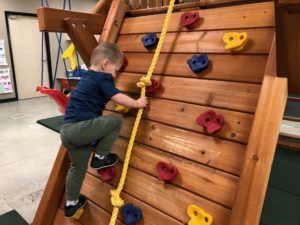
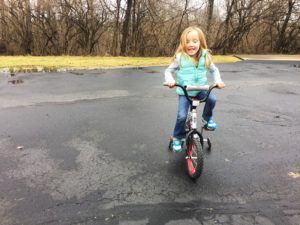

Being a parent in today’s world can be overwhelming and frankly scary. We are constantly being reminded of the ‘bad’ things that could happen to our own precious children due to being surrounded by social media. We are also more aware and educated about development which is a blessing but can lead to anxiety and worry.
As a pediatric physical therapist, it is not uncommon for me to see children who are diagnosed with developmental delay or have sensory deficits due to lack of exposure. This meaning the child just has not been exposed to or given the opportunity to practice a given skill or time to appropriately receive sensory input. For example, I was working with a 15-month-old who had just began independently walking. I took her outside to walk on the grass for a new challenge on an uneven surface. When she fell and touched the grass she began to cry because she did not like the feeling of the grass. Mom then explained this was her first-time feeling grass (at 15 months old). Another example are my toddlers that have weakness in their legs. When I take them to the gym to climb the jungle gym, I can feel the anxiety rise in their parents because they have never let the child climb a jungle gym before. If they are constantly being stopped from climbing and other activities similar to this then they may develop weakness in their legs when compared to their same aged peers.
I have caught myself with my own 2-year-old son, preventing development of a skill. He had difficulty using a spoon and fork and was starting to get delayed in this fine motor activity. I realized that he was delayed because I was not allowing him to practice. Sure, I let him use a spoon, but I would quickly take it away as soon as he would make a mess. Simply because I did not want food all over the rug or over his new shirt.
I understand that children do have delays and/or sensory deficits even when given all the opportunities possible. I just want to be a reminder that children need opportunities to grow, learn and explore at ALL ages. Not just growth in a physical way but a social and emotional way to. Take the cell phones away in the waiting room and let them socialize with the kids next to them. Let them climb the ladder to the slide (just stay near them for safety). Allow them to make a mess with their spaghetti when learning to use a utensil (maybe just remove their new shirt or put a bib on). We will never know their true potential if we are not facilitating and allowing them the opportunities to show us what they can do.
Written by: Sandra Koopmans PT, DPT
Read MoreImagine being in a room with no doors, but multiple windows on every wall. You try to shut one window so the breeze isn’t too strong, and two more windows open letting in birds chirping and someone else calling your name…you try to shut another window, but a new one opens with bright sunshine flooding the room. No matter how hard you try, new windows keep opening and distracting you with new information, that you just can’t filter out. This is the everyday life for person with ADHD.

ADHD is a neurodevelopmental disorder affecting 15 million people in the US alone, with most of people being diagnosed in childhood. While medication can often be beneficial to living a successful and productive life with ADHD, new research suggests training kids in mindfulness can allow them to combat impulsivity, high energy levels, and attention to tasks, before and in addition to medications prescribed by your doctor.
Mindfulness training teaches kids meditation strategies, which include, but are not limited to: focusing on breathing, breaking tasks down into smaller steps to realize what truly must be focused on to complete that task, how to ground yourself when emotions take over, understanding what your child likes and dislike about having ADHD, and enabling the child to realize when they need help. Much like your muscles in your body, your neuro-pathways in your brain take lots of training and practice to get stronger. That’s why it is important to practice mindfulness during tasks that are most important to your child and your family. It can be for simple things like during household chores, bed time routines, how to cope with emotions, how to follow directions, making new and keeping friendships, whatever the needs are!
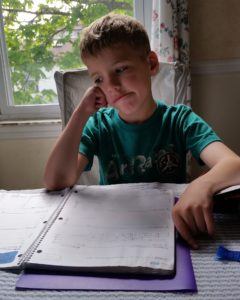
A great first step to work on is to just focus on taking breaths while keeping a still body. Try lying down with your child, with a pillow or stuff animal on your belly. Start for short time frames…can be as little at 10-30 seconds! Have your child place their hand on their belly, pillow, or animal friend, and state “all you have to do is breathe right now…in through your nose and out through your mouth…tell yourself you can control your thoughts and your body to stay still for this short time.” Once they are able to complete this step for a few minutes, have them try doing this while walking across a room telling your child “we are just walking and breathing…you can be in control of your thoughts and your body.” Once they master these skills in isolation, try some of the during your daily routine! Other supports like to do lists, post-it notes, calendars, and timers can beneficial to build time management and task completion. Mindfulness does not happen on its own naturally for children especially, so do not get discouraged if it takes some time for them to get the hang of it!

It’s important to remember that children with ADHD often get a lot of negative attention and often have strong feelings of worry, sadness, and embarrassment following their actions. Celebrate small victories and all the things that make your child unique, like their zealous for life, energy, and creativity! Ask your OTs for more mindfulness strategies you can use throughout the day!
If you have concerns about your child’s ability to focus, reach out to http://www.abcpediatrictherapy.com. We can help! Your child deserves it!
Information retrieved from:
Filling Your Toolbox with Techniques: Treating Children With ADHD
By: Amy M Schlessman, PT, DPT, DHS
Mindfulness for Kids with ADHD: Skills to Help Children Focus, Succeed in School, and Make Friends written by: Debra Burdick LCSW
Read MoreSummertime comes with lots of excitement! Between no school, trips to the pool, outside play, playdates with friends, and late bedtimes, summer serves as a great time for kids to re-boot from the school year and enjoy their main occupation, to play!
Summer also comes with its own unique set of woes for parents…the dreaded phrase “I’m bored” or “can I just play on my tablet?” often happens far too early into summer vacation. I encourage parents to have their kids follow a Summer Screen Time Checklist or and I’m Bored list with different activities for your child to accomplish and help fill their day with activities that will nourish their minds and bodies.
Here are some examples of activities you could include on your “Summer Screen Time Checklist”:
- Brush your teeth

- Get dressed
- Brush your hair
- Straighten up your room
- Read for 20 minutes
- Play outside for 1 hours
- Complete daily math problem
- Build or create something for 45 minutes
- Finish your daily chores
- Do something creative
- Do something helpful
These activities will provide much needs structure and balance to your day during the summer months, before resorting to screen time. Include your child while making the list so they feel like they have some control into what their daily schedule will entail; kids are much more willing to abide by new rules and lists if they feel the are part of the process.
My other favorite summer list is the “I’m Bored list” to hand or direct your child to time these words enter their vocabulary. Summer is a fantastic time to target not only fine motor and gross motor tasks, but also social skills and creativity, all in which can be accomplished through play! Below are tons of activities to have on your refrigerator for those “I’m bored” moments this summer:
- Play board games

- Draw a picture
- Write with sidewalk chalk
- Blow bubbles
- Make up a game
- Play dress up
- Read to yourself or a younger sibling
- Upcycle something into new item or game
- Learn to cook something…with a grown up of course
- Run through the sprinklers
- Set up a water table
- Water balloon fights
- Slip and slide
- Write a story
- Organize your toys or books
- Clean something for mom and dad
- Catch bugs or frogs
- Facetime with a family member
- Jump rope
- Ride a bike
- Roller blade
- Play 4-square
- Create friendly competitions
- Make a new friend
- Paint rocks for garden décor
- Make leaf rubs
- Paper airplane contest
- Build a fort
- Make bracelets or necklace
- Have a picnic
- Look at old pictures
- Start a lemonade stand
- Make a time capsule
- Play charades
- Have a staring contest
- Find toys to donate

- Wash the car
- Take pictures
- Water plants
- Pick flowers
- Write a letter
- Dig in the dirt
- Take a bubble bath
- Be helpful
- Make a sock puppet
- Have a fashion show
- Conduct an experiment
- Complete a maze or word search
- Play Simon Says or Duck, Duck…GOOSE
- Camp out in the backyard
- Go on walk
- Explore with a magnify glass
- Homemade bowling game
- Go on a scavenger hunt
- Make crafts
- Play tag or hide-and-go-seek
- Perform a play
- Make up a dance
- Get creative with legos or Playdoh
- Listen to music
- Create obstacle courses
- Play Hopscotch
- Play flip bottle
- Complete a puzzle
- Play dress up
- Walk the dog
ABC Pediatric Therapy Network LOVES to educate parents on normal development so you can build into your family. Visit us at http://www.abcpediatrictherapy.com to learn more.
Read More
Look what I can do!
At 0-3 months old, I will be able to start holding my head up when placed on my tummy. At first, I will be looking straight down, but with practice, I will be able to lift it even higher. Make sure my arms are under me so I learn to push up.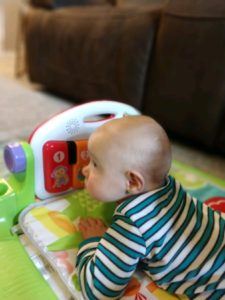
At 3-6 months old, I will be able to push up more through my arms so I can really look around. I will be able to reach for toys and bring them to my mouth. Make sure I have plenty of toys!
At 6-9 months old I will start to move around while on my tummy. I will pivot and I may learn to move backwards before I am strong enough to move forward. I love to explore!
At 9-12 months old I will be strong enough to push up onto my hands and knees for crawling. Watch out, world! Here I come!
Tummy time should always be supervised and done when your child is awake.
Tummy time should be done when your baby is happy – not tired or hungry.
Tummy time should not be done right after your baby has eaten. This can put pressure on a full tummy and cause your baby to spit up.
Perform tummy time for short intervals (10 minutes), several times per day.
Use a nursing pillow or small towel roll under the arms. This takes some of the weight off of the arms, making it easier to lift his head.
Use toys and music to make it fun.
Get on the floor so your baby can look at you.
Hold your baby on your chest, facing you, and recline back so you are face to face.
Babies loves to hear your voice and see your face!
When and how much?
Tummy time is needed every day and should begin the first day you bring your infant home from the hospital.
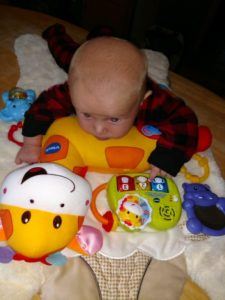 Start with just a few minutes at a time, several times per day. Gradually build up, as your baby is able to tolerate more.
Start with just a few minutes at a time, several times per day. Gradually build up, as your baby is able to tolerate more.
Why tummy time?
Tummy time helps your baby get stronger in order to develop his skills.
Tummy time is needed to promote motor skills such as sitting up and crawling.
It strengthens the hands for holding onto toys or a bottle and helps to develop vision.
Babies who do not spend time on their tummy are more likely to have delays in their motor skills.
What if my baby doesn’t like it?
Hang in there and keep trying! With practice and toys to make it fun, your child will learn to enjoy it.
Keep that perfectly shaped head
Babies who are placed too much in swings, car seats and on their backs and not enough on their tummy can end up having a misshapen head.
Putting your baby on his tummy several times throughout the day keeps pressure off of the back of the head and keeps that perfectly round little head.
Avoid having your baby sleep in a swing or car seat, if you can. Babies should be placed on their backs to sleep on a flat surface. The flat surface allows your baby to turn his head to either side, helping to form the perfect head shape.
Tummy time should be fun and provide learning opportunities.
Remember to place your child on their back to sleep.
If you have questions about your child’s development, visit https://www.abcpediatrictherapy.com. We love to help!
Read MoreFor a child, getting themselves dressed is a big accomplishment and can boost their self-esteem. There are many skills that are needed to get dressed including fine and gross motor skills, bilateral integration (the ability to use both sides of your body together with coordination), sequencing (putting skills together to achieve a final task), strength, motor planning (the ability to determine and carry out a series of motor actions), and sensory processing.
Children can begin assisting with dressing before their first birthday and gain independence in the upcoming years before being able to fully dress themselves at age 5.

What dressing skills should my child be able to do and at what age? The answers are below. Encourage the skill prior to the age it should be mastered. At first you will have to completely do the skill for your child. Talk to your child telling them all the steps to complete the skills. Progressively ask your child to help you with each step. Praise your child for their help with the task and successful completion. You will be teaching your child pride, sense of accomplishment and trust that you think they can. Great job parent!
By the time a child is 1 years old:
Your child should be able to take his shoes and socks off.
He/she should push their arms in sleeves once the shirt is placed over their head.
A 1 year old should push legs into pants when the pants are held for them.
By the time a child is 2 years old:
He/she should be able to help pull pants down.
A 2 year old should remove their own jacket.
By the time a child is 3 years old:
A 3 year old should be able to take off pants.
He/she can button and unbutton large buttons.
Your child will unzip and zip jacket once zipper is started.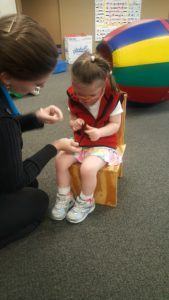
Three year old’s put on socks and shoes by themselves.
By the time a child is 4 years old:
He/she should be able to put on shirt and pants independently.
A 4 year old can take off his/her own shirt.
At this age, your child can snap, button, zip, and buckle a belt.
Putting socks on correctly is a skill at age 4.
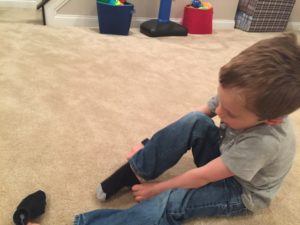
By the time a child is 5 years old:
Your child should be able to dress and undress himself including all fasteners and tie his shoes! You now have extra time for you!!
Continue to challenge your child now that you know what skills they should be doing and when. Push their potential to be independent. Praise their successes!
This is the way to raise a happy, confident child!!
If you need help teaching your child skills reach out to ABC Pediatric Therapy Network. We are here for you! If you have questions, call us or visit our website at https://www.abcpediatrictherapy.com.
Read More
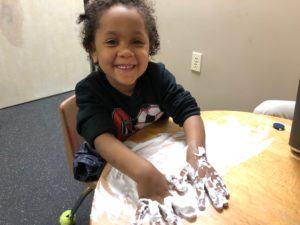
Winter time can be difficult for kids and parents, especially kids with higher sensory needs. Being stuck inside more means less time outside and fewer options for movement activities. Here are some ideas to get your kids moving and to keep them busy during those long winter months:
– Check out your local library for different classes they have – they often have story time and other free programs
– Many fast food restaurants or indoor malls can have play areas where they can climb and slide
– Stores that sell playground equipment will often have the option to play on equipment indoors for a small cost
– Children’s museums or other museums – some of them have a cost and others are free to the public
– Cooking or craft classes
– Indoor play cafes
– Nature centers
-Play in the snow!

– At home:
o Make an indoor obstacle course
o Science experiments
o Make homemade playdough
o Indoor snowball fight using wool dryer balls or rolled up socks
o Rice and bean bins
o Shaving cream, kinetic sand, play dough, putty activities
o Indoor scavenger hunt
o Create structures using marshmallows and toothpicks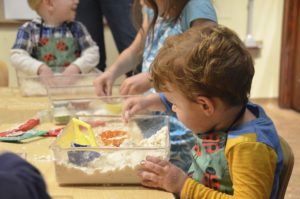
o Build a cardboard house
Continue to challenge your child’s development everyday. If you have any concerns, visit our website https://www.abcpediatrictherapy.com or give us a call. We are happy to help!
Read MoreABC Pediatric Therapy Network is always about progress! If you are receiving services somewhere other than ABC Pediatric Therapy Network and your child is achieving success, DO NOT change a thing. That is what ABC is all about …. SUCCESS! We want your child to be consistently showing progress. We, like you, want your child to reach their maximum potential.
View this post on Instagram
Testimonial Tuesday! Tell us something great about your child’s therapist!

If your child is not achieving success….at school, home therapy, outpatient therapy…. ask more questions. Ask what the goals are and why your child is not achieving them. Maybe modify the goals or the strategies to achieve them. Is your team on board to create change that is responsive to your child’s needs?! Let’s hope so!
Perhaps now is time for a change.
If you are receiving therapy at school, call an IEP meeting to discuss strategies. You might be able to increase the minutes your child is seen. Maybe you just need to modify the approach to the goal. You could change the location where the goal is being worked on – if in the classroom, try a private room. Maybe your child is being seen in a group and one on one would be better. Perhaps the stairs in the school are not motivating but the stairs to the playground are.
Add additional outpatient therapy to increase the intensity to reach goals. Having another perspective from another therapist can be beneficial. Private therapy is usually individual and this increased intensity might be just what your child needs.
Is summer approaching? What is your plan to push potential during the summer?
Are you at an outpatient facility and your child needs a change? Each outpatient therapy office has a different approach to treatment. Take a tour at another facility to see what best meets your child’s needs.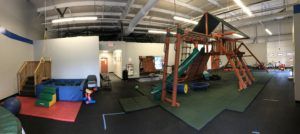
Therapy…success…change…progress – is all about communication. Your therapy team needs to listen to your and your child’s wants/ needs and modify the plan of care constantly to be responsive to you and your child. If you have found that…great! Celebrate the small victories and push for the big wins! If you have not found that, do not stop advocating for your child. You are often their voice as well as their cheerleader!
*Find the therapy approach – outpatient, school, one on one or group – that succeeds in ensuring your child progresses.
*Increase communication – update or change goals to accomplish more developmental milestones.
*Increase frequency – attend therapy more often or add outpatient to school therapy.
Whatever you do, do not stop trying something new or something different than what you are doing now until you see the progress you want for your child.
You know your child best. Achieving developmental milestones increases self esteem in your child. Feeling like you can do the same tasks as your friends creates a sense of acceptance and achievement.
Empower and educate yourself at www.abcpediatrictherapy.com. Reach out to ABC if we can help you in any way!
Read MoreThe ABC Interactive Screening Tool was developed to empower the parent. We want parents to know what to challenge and when. We do not want your child arriving at preschool or kindergarten not being able to cut, put on their coat or eat the snack provided. What can you, as a parent, do to ensure your child is reaching their potential? The answer…. get educated. We want to help! First, click below to fill out the online screening tool.
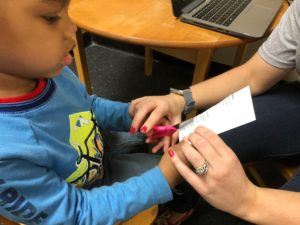
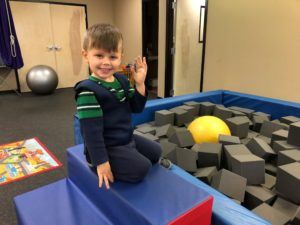
Ok, you have filled out the tool. Now what?!?
The tool was designed to be a quick look at how your child is doing. A chance for you to take a look for yourself. Try age appropriate skills with your child to really see for yourself how they are doing.
It is important to understand that this was just a glimpse. A full evaluation of skills at each age level would look at 50 or more skills where this tool only looks at 7- 10 skills for gross motor, fine motor and speech/language skills.
If your child misses 2 or more skills in any one area, we recommend an evaluation of those skills by a licensed therapist. Why? A therapist will be able to teach you what to encourage at home and how. Therapy may or may not be recommended for your child. A therapist wants to ensure that each child reaches age appropriate milestones in a timely manner.
If your child misses 2 or more skills when we are assessing 7-10 skills in the Interactive Screening Tool, we expect that they might miss significantly more when assessing 50 skills in a formal evaluation!
What could happen if my child is behind on skills?
Compensatory patterns could develop if your child is not achieving milestones. Your child may try to figure out how to achieve a skill even though muscle weakness exists. This may lead to the development of bad patterns that will affect future skills. For example, speed and agility for sports may be affected if a child does not develop higher level balance skills like 1 foot standing or walking on a balance beam. A child that does not spend time on his belly may show signs of weakness in his trunk or arms effecting handwriting or scissor cutting later. Children that do not like to climb on jungle gyms or swing on swings might find that riding a 2-wheeler is challenging in the future. This could affect social skills and friends as their friends will take off on their 2 wheeled bikes leaving your child behind to find a more sedentary activity to play.
Why does it matter if my child achieves skills on time?
As a parent, we want our children to succeed at their fullest potential. If our child like Legos or playing the trombone or playing football, all are great. We do not want them to be limited by their motor skills in their choices of what they choose to do or who their friends are. We want them to be able to decide based on their interests not their lack of ability.
For example, if your child chooses not to play sports. That is fine. As a parent, we just do not want him/her not to choose sports due to poor balance or strength.
If your child chooses not to be an artist, we do not want that choice influenced by weak hand/arm muscles. But just that your child prefers something else.
Our job as a parent is to challenge our child at their fullest potential and encourage them to make choices based on their interests.
So get educated. Know what your child needs to know how to do and when. That way you will have the right toys in your house. You will know when to get out the messy glue and paint. You will know when to supervise the scissor cutting. You will know when to leave extra time to “make“ your child tie his/her own shoes or even to be sure they are wearing tie shoes.
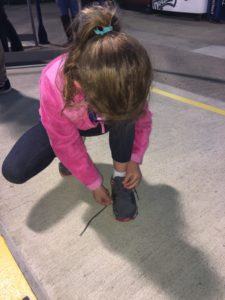
Good job parent! You are now educated on what your child should do and when.
Now, pay it forward!
Who else in your world wants to be an informed parent that can empower their child to reach their fullest potential!?! Share this link with them [email protected]!
Let’s change the lives of children together!
You will find answers to many of your developmental questions at https://www.abcpediatrictherapy.com
Read More Skip to content
Skip to content
